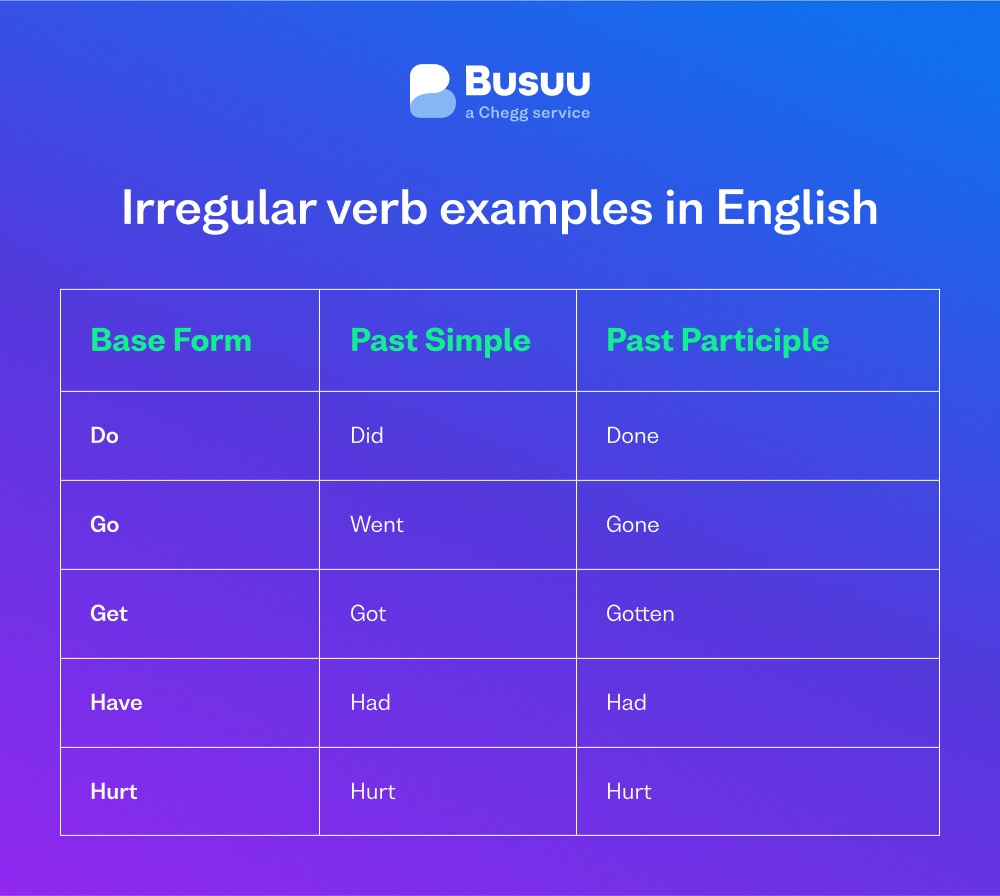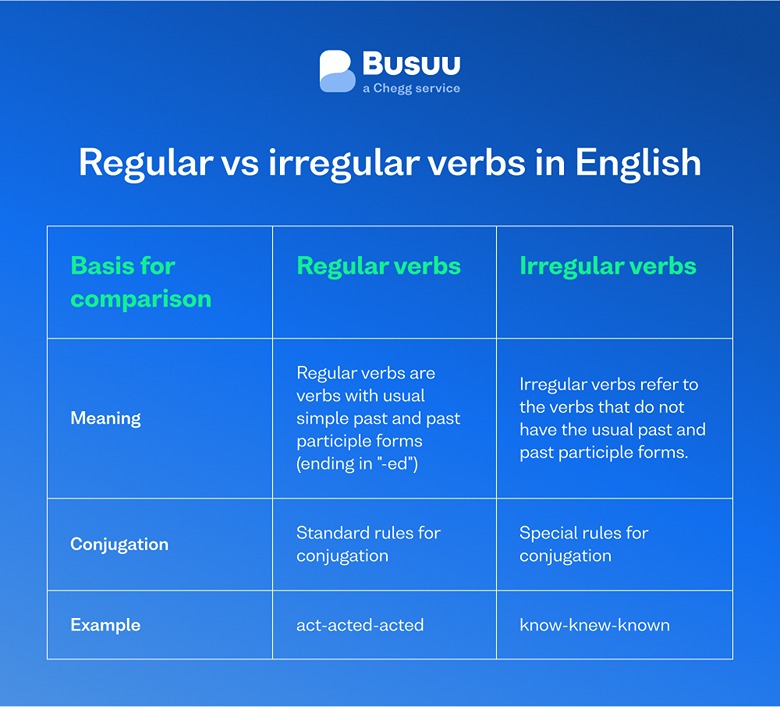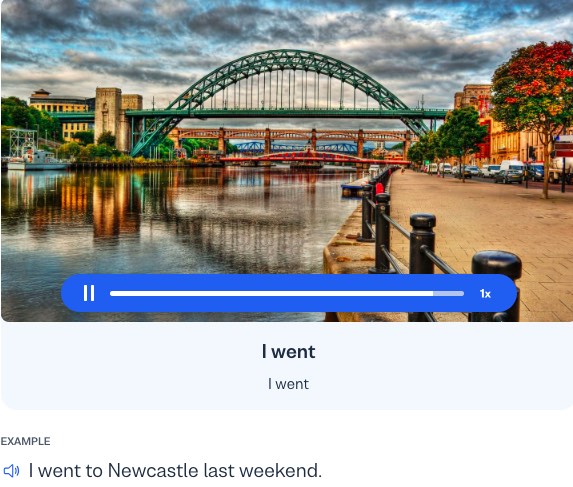Irregular Verbs in English: Overview and Examples
Learn these English irregular verbs and practice using them in your daily conversations.
I want to learn...
In this article, we'll journey through the twists and turns of irregular verbs, unraveling their complexities with clear explanations and practical examples.
Whether you're a beginner eager to start learning irregular verbs or an advanced learner aiming to polish your English skills, mastering these 150 irregular verbs will propel you toward fluency.
So, let's embark on this adventure together and learn more about English irregular verbs!
What are irregular verbs?
You have probably been using irregular verbs often without being aware of them. Once you understand irregular verbs with their definition then you will see that an irregular verb is a verb that does not follow the normal patterns of tenses.
You can see that many verbs end with -ed for past tense and participle forms, but in terms of irregular verbs, they do not follow the -ed pattern and they have their own unique tense forms and past participles. In other words, these verbs have their own style of writing.
To understand this in a better way, you can refer to these examples:

Irregular verb examples
| Base Form | Past Simple | Past Participle |
|---|---|---|
| Do | Did | Done |
| Go | Went | Gone |
| Get | Got | Gotten |
| Have | Had | Had |
| Hurt | Hurt | Hurt |
As you can see in the examples above, none of these has followed the -ed pattern either in past simple or in past participle tense. This quality of the irregular verb makes it unique.
Now that you are familiar with irregular verbs, here are some the ways in which they are different from regular verbs.
What is the difference between regular and irregular verbs?
In English, verbs have an important role to play. A verb is a word or group of words that is used to indicate that something happens or exists. For example, bring, happen and do are verbs.
These verbs are of two types:
1. Regular verbs
Regular verbs are verbs whose past participle and past tense are formed by simply adding -d or -ed to the base form of the verb. For example, the past participle of create is created and the past participle of submit is submitted.
You'll be happy to know that most verbs in English are regular, but the there are some very useful verbs that are irregular, so it's good to know how they work!
2. Irregular verbs
These are verbs that have the same or different present and past participles. For example, the past participle of go is gone, and the past participle of read is read.

Regular vs. irregular verbs
| Basis for comparison | Regular verbs | Irregular verbs |
|---|---|---|
| Meaning | Regular verbs are verbs with usual simple past and past participle forms (ending in "-ed"). | Irregular verbs refer to the verbs that do not have the usual past and past participle forms. |
| Conjugation | Standard rules for conjugation | Special rules for conjugation |
| Example | act-acted-acted | know-knew-known |
Here is a list of 150 irregular verbs used in daily life
| Base Form | Past Simple | Past Participle |
|---|---|---|
| lose | lost | lost |
| stride | strode | stridden |
| bring | brought | brought |
| break | broke | broken |
| withhold | withheld | withheld |
| beset | beset | beset |
| quit | quit | quit |
| show | showed | shown |
| weep | wept | wept |
| lie | lay | lain |
| arise | arose | arisen |
| shine | shone | shone |
| spill | spilt /spilled | spilt /spilled |
| overthrow | overthrew | overthrown |
| cut | cut | cut |
| bear | bore | borne |
| throw | threw | thrown |
| send | sent | sent |
| weave | wove /weaved | wove /weaved |
| rise | rose | risen |
| wring | wrung | wrung |
| get | got | gotten |
| broadcast | broadcast | broadcast |
| bend | bent | bent |
| sink | sank | sunk |
| let | let | let |
| wake | woke | woken |
| see | saw | seen |
| sweep | swept | swept |
| fly | flew | flown |
| sing | sang | sung |
| mow | mowed | mowed |
| shed | shed | shed |
| pay | paid | paid |
| stick | stuck | stuck |
| be | was, were | been |
| wear | wore | worn |
| wed | wedded /wed | wedded /wed |
| grind | ground | ground |
| buy | bought | bought |
| burst | burst | burst |
| speak | spoke | spoken |
| withdraw | withdrew | withdrawn |
| keep | kept | kept |
| build | built | built |
| creep | crept | crept |
| begin | began | begun |
| sell | sold | sold |
| thrust | thrust | thrust |
| smell | smelled | smelled |
| hear | heard | heard |
| drink | drank | drunk |
| bid | bid | bid |
| overcome | overcame | overcome |
| breed | bred | bred |
| burn | burned or burnt | burned or burnt |
| sew | sewed | sewn/sewed |
| win | won | won |
| sleep | slept | slept |
| cling | clung | clung |
| have | had | had |
| sting | stung | stung |
| speed | sped /speeded | sped /speeded |
| put | put | put |
| mistake | mistook | mistaken |
| rid | rid | rid |
| dig | dug | dug |
| bleed | bled | bled |
| lead | led | led |
| become | became | become |
| smite | smote | smitten |
| freeze | froze | frozen |
| forbid | forbade | forbidden |
| eat | ate | eaten |
| blow | blew | blown |
| meet | met | met |
| prove | proved | proved/proven |
| come | came | come |
| understand | understood | understood |
| run | ran | run |
| shut | shut | shut |
| thrive | thrived /throve | thrived |
| kneel | knelt | knelt |
| spoil | spoilt /spoiled | spoilt /spoiled |
| mean | meant | meant |
| spread | spread | spread |
| cast | cast | cast |
| feed | fed | fed |
| wind | wound | wound |
| spend | spent | spent |
| hide | hid | hidden |
| fit | fit | fit |
| deal | dealt | dealt |
| grow | grew | grown |
| uphold | upheld | upheld |
| plead | pleaded/plead | pleaded/plead |
| bind | bound | bound |
| slit | slit | slit |
| spring | sprang | sprung |
| cost | cost | cost |
| go | went | gone |
| fling | flung | flung |
| spell | spelled | spelled |
| forgive | forgave | forgiven |
| forget | forgot | forgotten |
| spit | spat | spat |
| choose | chose | chosen |
| hurt | hurt | hurt |
| steal | stole | stolen |
| know | knew | known |
| draw | drew | drawn |
| dream | dreamed or dreamt | dreamed or dreamt |
| ride | rode | ridden |
| give | gave | given |
| read | read | read |
| fight | fought | fought |
| write | wrote | written |
| cast | cast | cast |
| foretell | foretold | foretold |
| arise | arose | arisen |
| catch | caught | caught |
| say | said | said |
| tread | trod | trodden |
| fall | fell | fallen |
| hit | hit | hit |
| forsake | forsook | forsaken |
| sit | sat | sat |
| swim | swam | swum |
| flee | fled | fled |
| shrink | shrank | shrunk |
| swell | swelled | swelled /swollen |
| tell | told | told |
| shear | sheared | sheared/shorn |
| bite | bit | bitten |
| hang | hanged | hanged |
| shake | shook | shaken |
| spin | spun | spun |
| drive | drove | driven |
| do | did | done |
| light | lit/lighted | lit/lighted |
| lend | lent | lent |
| find | found | found |
| overdo | overdid | overdone |
| upset | upset | upset |
| understand | understood | understood |
| slide | slid | slid |
| think | thought | thought |
| shoot | shot | shot |
From the list given above, you can understand irregular verbs and use them proficiently in your everyday usage of the English language.
Hopefully, this article has helped you in understanding the differences between regular and irregular verbs. This concept is something that will make your English grammar much better than before.
There are many more English irregular verbs to discover!
We’re Busuu, the language-learning app – and we help people really learn English.
Level up with help from online courses crafted by language experts, support from our community of millions of native English speakers, and more.

